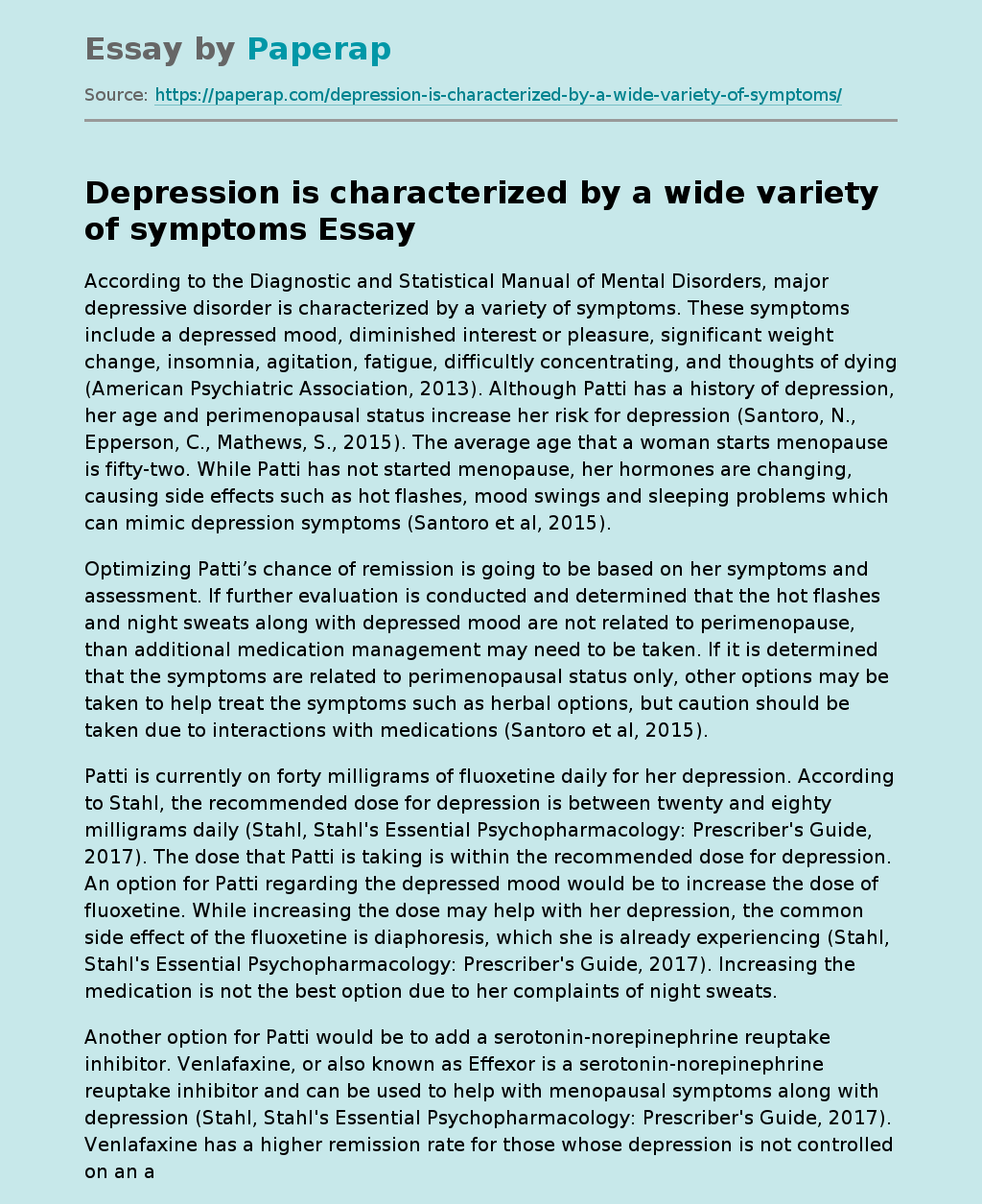Depression is characterized by a wide variety of symptoms
According to the Diagnostic and Statistical Manual of Mental Disorders, major depressive disorder is characterized by a variety of symptoms. These symptoms include a depressed mood, diminished interest or pleasure, significant weight change, insomnia, agitation, fatigue, difficultly concentrating, and thoughts of dying (American Psychiatric Association, 2013). Although Patti has a history of depression, her age and perimenopausal status increase her risk for depression (Santoro, N., Epperson, C., Mathews, S., 2015). The average age that a woman starts menopause is fifty-two. While Patti has not started menopause, her hormones are changing, causing side effects such as hot flashes, mood swings and sleeping problems which can mimic depression symptoms (Santoro et al, 2015).
Optimizing Patti’s chance of remission is going to be based on her symptoms and assessment. If further evaluation is conducted and determined that the hot flashes and night sweats along with depressed mood are not related to perimenopause, than additional medication management may need to be taken. If it is determined that the symptoms are related to perimenopausal status only, other options may be taken to help treat the symptoms such as herbal options, but caution should be taken due to interactions with medications (Santoro et al, 2015).
Patti is currently on forty milligrams of fluoxetine daily for her depression. According to Stahl, the recommended dose for depression is between twenty and eighty milligrams daily (Stahl, Stahl’s Essential Psychopharmacology: Prescriber’s Guide, 2017). The dose that Patti is taking is within the recommended dose for depression. An option for Patti regarding the depressed mood would be to increase the dose of fluoxetine.
While increasing the dose may help with her depression, the common side effect of the fluoxetine is diaphoresis, which she is already experiencing (Stahl, Stahl’s Essential Psychopharmacology: Prescriber’s Guide, 2017). Increasing the medication is not the best option due to her complaints of night sweats.
Another option for Patti would be to add a serotonin-norepinephrine reuptake inhibitor. Venlafaxine, or also known as Effexor is a serotonin-norepinephrine reuptake inhibitor and can be used to help with menopausal symptoms along with depression (Stahl, Stahl’s Essential Psychopharmacology: Prescriber’s Guide, 2017). Venlafaxine has a higher remission rate for those whose depression is not controlled on an antidepressant alone (Stahl, Stahl’s Essential Psychopharmacology: Prescriber’s Guide, 2017).
Depression is a common disorder but there is a risk of depression in the perimenopausal state (Santoro et al, 2015). Adding a serotonin-norepinephrine reuptake inhibiter seems to be the best option for Patti. If she is experiencing an increase in depression, then venlafaxine is a choice that will improve the resistance of depression (Stahl, Stahl’s Essential Psychopharmacology: Prescriber’s Guide, 2017). If the symptoms that Patti is having is related to the perimenopausal status, the venlafaxine and other selective serotonin inhibitors have been proven to reduce menopausal symptoms from ten to sixty percent (Santo et al,2015).
Depression is characterized by a wide variety of symptoms. (2021, Dec 05). Retrieved from https://paperap.com/depression-is-characterized-by-a-wide-variety-of-symptoms/

